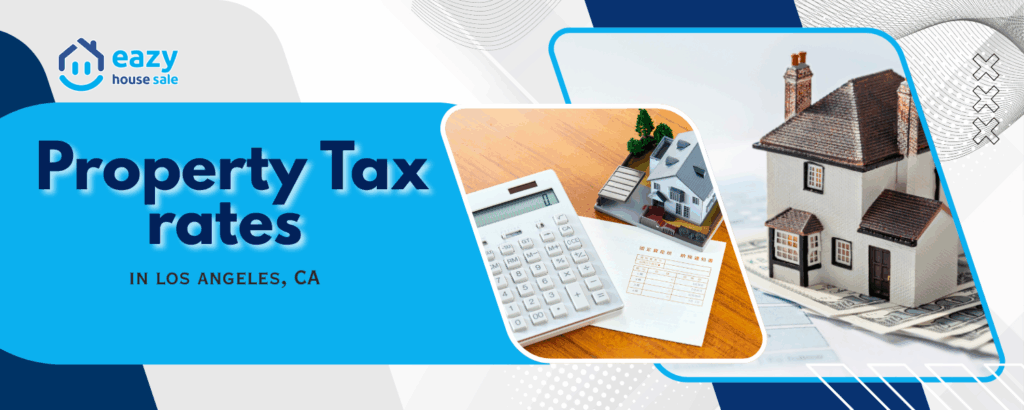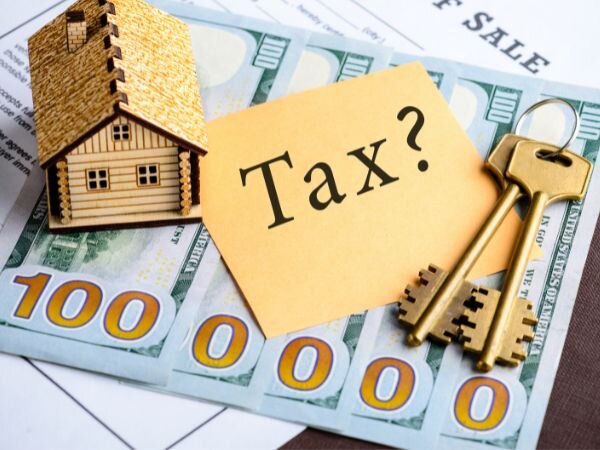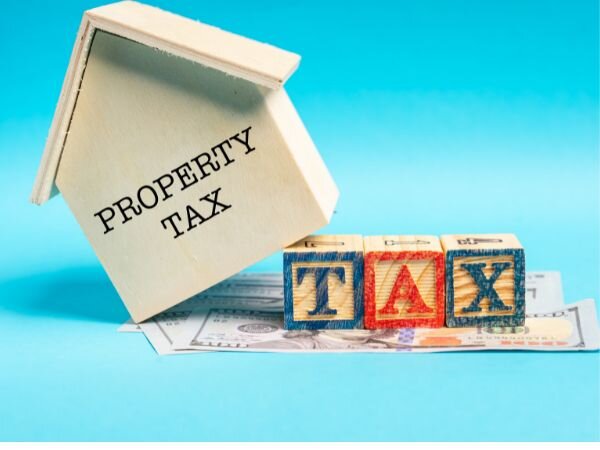California Property Tax Rate: Los Angeles CA Property Tax Rate & Property Insights

Homeowners and prospective buyers in Los Angeles, CA, should know the property tax rate because it affects home prices. California’s high living costs make it important to understand local taxes to better manage your budget. The Los Angeles property tax rate, including what to expect and how to handle it, is covered on this site. Making municipal taxes simple may help homeowners choose property investments and potential buyers organize their finances in this bustling city.
Brief Overview
Homeowners and prospective buyers in Los Angeles must know the city’s property tax rates. This is because these taxes greatly affect the cost of buying a home in a high-priced city. Proposition 13 in California gives homeowners more predictability in tax assessments, preventing market-driven increases. You must manage your money carefully because levies and parcel taxes may affect how much you owe. Tax breaks for seniors and other groups in your area make it even more important to stay current on tax laws to make the best decisions about your money and assets in the ever-changing real estate market.
Key Highlights
- Proposition 13 states that California property tax rates vary widely by county.
- Proposition 13 caps annual assessed value increases at 2%, providing certainty. Many new customers are affected.
- Local governments can contribute to Los Angeles’ 1% property tax levy, raising the cost.
- Common exemptions like the Homeowners’ Exemption lower a taxable home’s value. This simplifies tax payments for qualifying homeowners.
- Checking regularly, recognizing exemptions, and using payment systems will help you manage your taxes.
Understanding California Property Tax
Homeowners should understand the California property tax since it affects their finances. Your California property tax may vary greatly based on where you live. Each California county has its own property tax standards. If you understand the base rate and taxes, you can make smart property investments. This section discusses California’s property tax laws and how they differ from others. It also lists the state’s tax calculator, assessed values, and tax reductions.
| Component | California Property Tax | Comparison with Other States | Implications for Homeowners |
| Tax Rate | Averages around 0.73% | Typically lower than national average of ~1.07% | Lower annual tax costs compared to high-tax states |
| Assessment Method | Based on purchase price with limited annual increases (Prop 13) | Many states reassess annually based on market value | Stable taxes, less fluctuation with market changes |
| Property Tax Cap | Annual increases capped at 2% until property is sold | Few states have similar restrictions | Predictable long-term tax liability |
| Exemptions | Homestead, veterans, and elderly exemptions available | Varies widely, with some states offering more generous rates | Potential for reduced tax burden through exemptions |
| Revenue Use | Primarily for public schools and local services | Common use, though some states allocate differently | Direct impact on quality of local amenities and education |
This table encapsulates the distinct characteristics of California’s property tax system and its implications for homeowners, offering a clear comparison with other states’ tax structures.
Overview of Property Tax Laws in California

Proposition 13 established California property tax standards in 1978. Prop 13 states that a property’s assessed value is usually the same as its acquisition price. This assessed valuation can’t rise more than 2% a year unless the property is sold or built. This structure helps property owners plan for taxes by maintaining the tax base rate. California’s base property tax rate is 1% of assessed value, but local governments may charge more. The overall tax rate can be greater than the base rate because these extra levies pay for roads and schools.
The California State Board of Equalization handles property taxes. County tax assessors visit properties to determine property taxes. Every California county employs this property tax system, however rates and exemptions vary. To determine their local tax obligations, property owners should contact their county tax assessor. California homeowners may receive various exemptions. Example: The homeowners’ exemption reduces the assessed value of their home by $7,000. Owners can minimize their property taxes annually by knowing these laws and exclusions.
Cali homeowners benefit from tax decreases since they save money. The senior citizens’ exemption and other disability exclusions can save people a lot of money. A solid understanding of California property taxes ensures homeowners can use these options appropriately. As property laws change, California property owners must stay current on tax rates, assessed values, and exemptions.
How California Property Tax Differs from Other States
Because of how it implements Proposition 13, California’s property tax system is unique. California homes have constant assessed values. This makes it more predictable than in places where property taxes alter annually based on market value. This is great, especially with fast-rising Los Angeles County property values. Because the annual assessed value can only rise by 2%, homeowners are protected from large tax spikes in states without these limits. This is good, but the state’s tax structure might be harsher on new homebuyers because they pay tax on the home’s price.
It’s interesting that California bases assessments on purchases, but many other locations do this annually to keep up with the market. This strategy works well for long-term homeowners whose homes have appreciated in value but not in taxes. However, new buyers pay higher taxes for the same property than long-term owners. States also approach exclusions differently. Veterans and elders get special tax breaks in California. Many states provide broader exemptions for more persons.
In addition to these fundamental differences, California’s tax system has challenging special assessment procedures. These taxes fund community necessities like better public schools and infrastructure. Although the base rate is 1%, these extra taxes can raise it significantly. It can be the same or higher than in states with higher tax rates. Homeowners and prospective buyers must know these facts to make informed property decisions, track their money, and pay their taxes on time.
The practical impacts of property tax provisions for California homeowners and potential buyers are multifaceted and significantly influence financial decision-making.
- California’s property tax structure and Proposition 13 make it easier for homeowners to estimate their future tax bill. This simplifies long-term budgeting and financial planning. Because homeowners know their property tax won’t rise much each year over the regulated amount, they can better plan for future costs.
- Long-term homeowners benefit greatly from property tax limits because their taxes are based on the initial purchase price and can only rise slightly. Property taxes remain low as prices rise, unlike other assets. This increases their investment funds.
- New buyers may struggle to enter the market due to hefty initial property taxes based on market prices. This makes buying a home more expensive and may deter buyers, especially those with little funds.
- Assessed Value Caps and Market Competition: The cap on assessed value increases may make house buying and selling in LA difficult. It encourages homeowners to stay longer to reduce taxes. This may mean fewer homes for sale and increased competition for them.
- Community Development Decisions: Special tax assessments can significantly impact community development by funding vital public services and enhancements. These extra costs are commonly considered by homeowners and prospective buyers when choosing a home. This may affect their choice between well-developed and under-construction communities.
- Senior and Veteran Homeowner Exemptions: These groups benefit greatly from exemptions. They can assist low-income households keep their houses and give them much-needed tax breaks. To allow the poor to live in their areas, these exemptions are essential.
- City and rural property dynamics differ due to tax restrictions. Urban regions with greater property values and taxes may benefit from capped assessments. However, rural residents may not feel as much strain from rising taxes.
All of these factors affect Californians’ real estate and tax decisions. They help people find the best home, stabilize their finances, and increase the state’s economy.
Property Tax Rates in Los Angeles
Los Angeles property owners must consider property tax rates. Homebuyers must consider the city’s tax rate when budgeting. Knowing what determines rates helps you plan. Consider the basic property tax and any local taxes that may affect the tax rate. Los Angeles County homeowners must know these minor things to maintain their finances. This section covers the most important aspects of Los Angeles property tax rates.
What Is the Property Tax Rate in Los Angeles?

When all taxes and assessments are added up, you may calculate your Los Angeles property tax. Los Angeles County’s property tax rate is mostly regulated by Proposition 13. From 1% of the property’s assessed value. Just remember that this is the base rate. Local governments charge extra taxes for schools, water districts, and other essential services, so property owners may pay more. Some call these “parcel taxes.” For instance, parcel taxes might increase a homeowner’s payment by hundreds of dollars, which can significantly increase the total cost over time.
Thus, taxes are dependent on the property’s assessed value, usually its purchase price. Prop 13 limits assessed valuation increases to 2% a year unless the property is sold or developed. This gives homeowners predictability because rates won’t fluctuate. Based on their house values, new homeowners may pay high taxes even with the cap. Thus, Los Angeles County real estate market fluctuations may effect them more than longtime residents.
Differing sections of Los Angeles have differing property taxes, which is noteworthy. The base rate doesn’t fluctuate, but supplementary taxes do based on community needs and government decisions. Some places may pay additional taxes due to municipal bonds or assessments for education or infrastructure spending. If you want to buy a house in Los Angeles, you must consider these differences. You must visit your local tax assessor and use all available resources to understand your prospective liabilities. If you want to buy a house or live in Los Angeles, you must know the property tax rates and what impacts them as part of your financial strategy.
Factors Influencing Tax Rates in Los Angeles
Los Angeles homebuyers should know that many factors determine property tax rates. The city must pay for many public services, which is one reason. Los Angeles County’s size and population require a lot of funding for public services including transportation, safety, and education. Voters often directly change tax rates to meet these requirements. Better schools and public transportation bonds can raise the rate above the base level. This may affect property owners’ finances.
Another factor is that Los Angeles real estate prices fluctuate. Proposition 13 limits assessed value increases to 2% per year. New buyers may face higher initial assessments due to market conditions. This mismatch can vary consumers’ tax rate views and influence their purchases. Because different towns have different local government programs, some may have higher rates because they opted to pay more taxes. This emphasizes the importance of local government in determining tax liability.
Los Angeles has many tax incentives and exclusions that may reduce these rates. The Homeowners’ and Senior Citizens’ Exemptions diminish home values for tax purposes. Anyone who qualifies can seek financial aid. Homeowners must understand these options to file taxes correctly. Homeowners can better predict rate adjustments by monitoring legal developments like new bond measures or expected municipal tax increases.
We must examine many factors to explain Los Angeles property tax rates. To determine how much money you need to buy county land, you must understand local and state laws, regional programs, and market trends. Understanding this intricacy can help present and prospective Los Angeles real estate purchasers make better financial decisions and maximize their investments.
Calculating Your Annual Property Tax
Knowing how Los Angeles and California compute property taxes can affect your money management. A full review begins with calculating your tax liability based on your home’s value. A tax calculator can aid by accounting for all deductions and exemptions. Many factors, including local add-ons and state-wide regulations, make these computations difficult for homeowners to understand. Learn about popular deductions and exclusions to reduce your possible responsibilities and manage your annual property costs.
Steps to Determine Your Tax Bill
How much property tax you pay in Los Angeles depends on how much your home is worth. First, you must determine your tax liability, thus this amount is crucial. When a property is bought in California, especially Los Angeles County, the assessed value almost always matches the purchase price. This assessed value can’t rise more than 2% every year under Prop 13. The only exceptions are property transfers and major structural alterations. This technique allows homeowners plan their taxes each year without worrying about market value changes raising taxes.
To calculate your tax bill, first determine California’s base property tax rate, which is 1%. This is just the beginning; different local governments may apply different taxes, which could significantly vary your tax rate. Los Angeles County may need to raise taxes to fund schools, parks, and building projects. Municipal fees, sometimes known as special assessments or parcel taxes, can add hundreds of dollars to your annual tax payment, so be careful when calculating your tax bill. Property owners can estimate their tax liability with a tax calculator. A calculator can calculate your debt by adding base rates and local taxes.
This computation must include all local tax factors to be accurate. County tax reductions and incentives in California are highly variable. If homeowners understand these things, they may be able to better budget and plan. The LA County tax assessor’s office can also explain how your property’s valuation is determined. This may help you dispute a high assessment. Online tools and frequent tax professional consultations will help you understand how your annual tax bill is calculated. In addition to paying your property taxes, you must comprehend each item of the tax statement and how it affects your annual property tax bill. With this information, you can handle property taxes for the whole individual.
Common Deductions and Exemptions

Know about popular deductions and exemptions in addition to calculating your property tax. These things are vital for tracking your tax bill because they can cut your total obligations significantly, especially in expensive Los Angeles County. A popular exemption, the Homeowners’ Exemption, can reduce your principal property’s value by $7,000. The deduction means homeowners will pay less in taxes, which is great. It advises checking if you qualify and requesting this exception whenever possible. Many tax advantages in Los Angeles and California enable some people make ends meet. Due to their limited incomes, seniors and veterans may qualify for tax exemptions. These deductions are essential for keeping up with house ownership costs in pricey areas.
Seniors, disabled people, and low-income people can postpone property tax payments. This can help them throughout financial hardships. You should also know about local exemptions. Certain California counties may offer rebates or further reductions in assessed values. In Los Angeles County, voters can approve special laws to add or amend deductions. Checking in with the Los Angeles County Assessor’s office regularly will help you find these possibilities and discover new ways to save money. Looking at more tax relief possibilities may help you manage your property taxes. California’s regulations and standards change frequently, so it’s important to stay abreast of tax break eligibility and amounts. This ensures homeowners can take advantage of all tax advantages. Using all the deductions and exemptions you can find helps you stay financially healthy and increases the value of your property in a competitive and expensive market like Los Angeles. If you prepare ahead and visit tax professionals or municipal officials regularly, you can pay your property taxes annually.
Managing Your Property in Los Angeles County
Buying property in Los Angeles County requires understanding how complex property taxes are and how they affect your finances. Property values and municipal tax requirements change frequently, so keeping up with your taxes is crucial. This section details property tax tips. It offers advice to stay on track and manage your finances. If you understand property tax bills, payment plans, and working with the county tax collector, you may better manage your property’s finances.
Tips for Staying on Top of Property Taxes
To keep up with Los Angeles County property taxes, plan ahead and budget wisely. You must first determine the value of your property. Checking your property tax statement often might help ensure the assessed value matches the market. This prevents unexpected tax increases. Contact your local tax assessor’s office for updates and any changes. This will ensure accurate tax obligations. Understanding taxes might also help you track your bills annually.
Knowing what the tax collector does and how to pay is also important. Los Angeles County residents can pay taxes online or in person. Paying online can streamline processes, ensure timely payments, and reduce the risk of fines. Setting reminders for payment due dates helps you avoid skipping payments and significant fines. If you use automatic payment solutions, you won’t have to manually track payments. This will free up time for other property management tasks.
If you own many properties, consolidate your tax management. This involves finding out when goods are due and researching bulk payment options or exemptions for property owners with many. Digital solutions like property management software may streamline this procedure. These tools usually provide all your property, tax, and deadline information. This simplifies prioritization and speed up work. Technology is helpful for homeowners and investors with several properties to handle taxes.
Knowing about deductions and exemptions helps lower your taxes. The Los Angeles Homeowners’ Exemption decreases a home’s tax value, benefiting homeowners. This simple procedure can save you a lot, especially in expensive Los Angeles. Special deductions or extensions allow seniors and veterans to pay taxes more freely. Checking for exemptions and applying quickly can improve your finances.
Finally, keeping up with local property tax changes might help you avoid unexpected financial issues. Public policy developments that could effect Los Angeles tax rates should be monitored. By keeping up with the current laws, tax specialists can help you choose the optimum tax strategy. In ever-changing Los Angeles County, being proactive and informed about property taxes can maintain your home’s value and financial security.
Los Angeles homeowners and prospective buyers in California should know the city’s property tax rates. The city’s urban splendor and high living costs make property tax rates important for your investment. By using exemptions and knowing local tax laws. If property taxes are cutting into your budget, Eazy House Sale can help. We buy houses for cash in Los Angeles — no repairs, no fees, and no waiting for months. Contact us today!
Helpful Los Angeles Blog Articles
- Sell Your House Directly To The Bank In Los Angeles, CA
- Best and Worst Neighborhoods in Los Angeles, CA
- Los Angeles, CA Neighborhood Map
- Fun Facts About Los Angeles, CA
- Los Angeles, CA Property Tax Rate
- Best Los Angeles, CA Property Managers
- Free Things to Do in Los Angeles, CA
- Los Angeles, CA Cost of living
- Los Angeles, CA Closing Costs Calculator
- Selling Old House in Los Angeles, CA
- What Do You Do When You Inherit A House with A Mortgage in Los Angeles, CA
- How Long To Live In A House Before Selling in Los Angeles, CA

